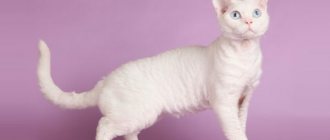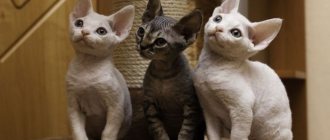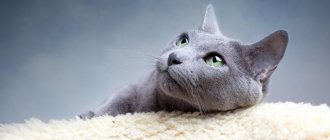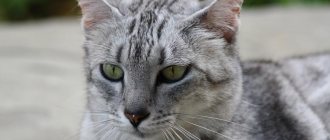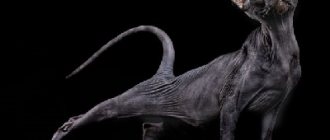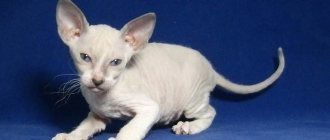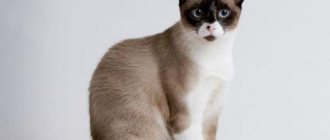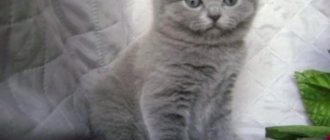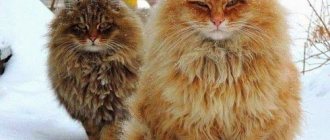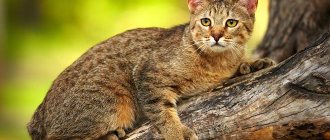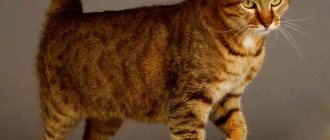All Rex cats have an unusual coat - due to the reduced intensity of hair growth, it is shorter and softer, and appears curly. The cats were named Rex because of the similarity of their fur to that of domestic rabbits of the same breed.
There are several types of Rex, which made it possible to develop different breeds - Devon Rex, Cornish Rex, German Rex.
Origin story
In 1960, Devonshire resident Baryl Cox discovered a pregnant cat near her house. She adopted the animal. An unusual kitten with curly hair appeared in the litter. He differed from his brothers in body and head shape. The baby received the nickname Kirli (“curly”). He became the founder of the breed, which is also called the Devonshire Rex.
9 years earlier, in the neighboring county of Cornwall, a curly-haired cat was also discovered, called Rex (the so-called rabbits with curly hair). Sterling Webb bred curly-haired Cornish cats. Having learned about the curly Kirley, she wanted to cross him with her cats so that such a characteristic as curly fur would be fixed. However, she was disappointed: all the kittens were born with straight fur. It became clear that different genes are responsible for the curls on the fur of cats. Subsequently, Kirli was crossed only with females who were his relatives.
In 1967, the Cornish Rex received the name “Cornish Rex”, and the Devonshire Rex – “Devon Rex”. In the same year, the breed was announced and a description of the main characteristics appeared.
Mr. Cat advises: choosing a name for your pet
You need to choose an unusual nickname that reflects the character, behavior, and appearance of the animal.
Suitable names for females:
- Giselle;
- Fly;
- Athena;
- Grace;
- Mystery;
- Dixie.
Interesting nicknames for cats:
- Batman;
- Elf;
- Yakhont;
- Drake;
- Alf.
You can use your imagination and choose a more suitable name for your pet. Only the owner knows the distinctive features of the pet and can, based on them, give a unique nickname. The cat will get used to it quickly.
Breed standard
Kirley's cat was the only one of his kind, so inbreeding was carried out to preserve the curly gene. To strengthen immunity, overall health, and add colors, Devonshire cats were crossed with other breeds. Such a relationship did not always produce curly-haired kittens. But from the mating of pure Devons and their hybrids, 50% of the litter had curls.
Hybrids were and are sold as gene carriers. With proper breeding, they can produce purebred Devon Rex kittens.
In England, Devons were crossed with Cornish, Burmese, Persian and British. When the Devon Rex cat breed appeared in America, they began to be bred with American and British shorthair cats. "Other" blood is allowed by the GCCF (English feline organization) except for the blood of the sphinx. If there was a Sphynx in the Devon Rex's pedigree, such a cat loses the right to breed. FIFe and WCF do not accept the infusion of other blood.
CFA allows mating of Devon Rex with the following species:
- American Shorthair;
- British Shorthair;
- European shorthair.
TICA allows the above 3 connections with breeds such as:
- Burmese;
- Canadian Sphynx;
- Siamese;
- Bombay.
As a result, the Devon Rex breed was divided into 2 types: American (overwhelmingly with a mixture of American and British Shorthairs) and European (with a mixture of Burmese, Siamese, and Cornish).
Devon Rex breed description:
| Become | American | European |
| Body type | An animal with short legs, neck, tail. Short muzzle. The stop is clearly pronounced. Wide chest. | Long legs, neck and tail. The hind legs are slightly longer than the front ones. The muzzle is elongated. The transition from the forehead to the nose is weakly expressed. |
| Eyes | Oval, set slightly obliquely. Eye color matches coat color. | |
| Ears | Very large, set wide, rounded at the tips, tassels possible. Very wide at the base. | |
| Eyebrows and mustache | Vibrissae have curls. | |
| Head | Massive, short, wedge-shaped. There is a sharp transition from the cheekbones to the pads of the mustache. The chin is well defined. | |
| Color according to standards | Any cat colors. However, Devon cats with color point color should have blue eyes, and Minkies should have green-blue eyes. | |
| Wool | Twisted into curls. Longer coat on sides, thighs, face and back. Soft to the touch. Guard hairs are almost invisible. The wave is more pronounced on the tail and body. | |
How to choose a kitten
It is recommended to buy kittens from breeders or nurseries, where you can get acquainted with the documents of the animals, their pedigree and see the parents. When choosing, you should first of all pay attention to the activity and uniformity of the coat. Be sure to check your eyes and ears: they should be free of any discharge.
It wouldn’t hurt to look under the tail, it should be clean there too. The ideal age for purchasing an animal is considered to be 3–3.5 months.
A Devon Rex kitten has thick, wavy hair for up to two months, but after a month it begins to actively fall out. Therefore, by the time the time comes to take the animal home, it looks more like a sphinx than a representative of the curly breed. From 3 to 6 months, wavy hair can remain only on the paws and tail, and the entire body is usually either hairless or covered with light fluff. These signs should not frighten future owners, as they are a distinctive feature of Devon Rex kittens and do not allow them to be confused with similar Cornish Rex cats.
Since adult fur is formed only by six months, when choosing a kitten, it is advisable to see it before 2 months of age. Then it will be difficult for the owner to determine what color animal he is buying.
Small Devon Rexes look rather unattractive until they are six months old, but subsequently each “ugly duckling” turns into a beautiful “swan”.
Distinctive features of Devon Rex kittens are also:
- triangular head shape;
- long paws;
- large ears with a wide base.
A healthy kitten will be active, playful and easy to interact with humans.
There are quite a few Devon Rex breeders and nurseries in Russia. In this regard, the price of a kitten with a pedigree and a full package of documents will be about 40 thousand rubles. An important factor affecting the cost is the color of the animal. If it is rare, and the wool is very curly, this can increase it up to 50-70 thousand rubles.
A kitten without documents can be purchased for 20 thousand rubles. But when deciding to take such a step, you need to understand that the pet you are buying may turn out to be sick or not purebred.
Breed Features
Devon Rexes are so unique that they are easily distinguished from other curly breeds:
- Devonian species, which is formed from the shape of the body, head, large ears and eyes. The appearance, similar to fairy-tale elves, made the breed unique.
- Dog behavior is another feature of Devon dogs. They are often compared to monkeys or dogs. They are very sociable, active, restless.
- The wavy coat is distributed unevenly over the body. This is the result of a mutation. No other representative of the cat world has such a gene. Devonshires are nicknamed "hot cats". The fact is that due to the characteristics of the coat, body heat is not retained in the undercoat. When you touch the skin, it feels hot and your pet has a fever. That is why Devon Rexes like to bask in the winter near the radiators and wrap themselves warmly under a blanket.
Distinctive features
Representatives of the breed, due to the special structure of their ears, resemble elves: large, widened at the base, low set - framing the muzzle. Some individuals have hair growing on them in tufts. Sometimes the mustache and eyebrows also curl - this enhances the “alien” appearance.
The prefix “rex” denotes the genetic mutation code responsible for the curly, curly coat. The breed is soft and thin. According to the description, the colors are varied.
The animal grows to medium size. The weight of cats does not exceed two to three kg, and males three to four kg. Externally, representatives of the breed appear fragile and weak. But this is not so: they have a muscular body and strong limbs.
Similarities and differences from Corhish Rex
Devon Rex cats are similar to Cornish Rex cats because of their curls. Although these are completely different breeds. They have only the following features in common:
- they have wavy fur;
- they are from the neighboring counties of England;
- curiosity, playfulness, developed intelligence, affection for the owner.
This is where the similarities end.
| Differences | Cornish Rex | Devon Rex |
| Body | Elegant, lean. The arch of the back is high, as if the cat deliberately curved its spine. | Compact, with strong bones and chest. The muscles are highly developed. |
| Rexing (hair curl structure) | The curl type is closed, the ends point down. The curls are arranged compactly. Curls look like styling: elastic, orderly. The coat is without awns, silky. | The curls look tousled as each hair is pointing (curled) upward. The curls are large. The hair is soft and elastic to the touch. There are all three types of wool: guard, undercoat, and main coat. |
Mating a Devonshire with a Cornish results in kittens with straight hair.
Pros and cons of the breed
Before you decide whether to get such a pet, you should find out about all its advantages and disadvantages. The advantages of the Devon Rex Sphynx breed are:
- original appearance;
- friendliness;
- playfulness;
- devotion and love for the owner.
The disadvantages are that this breed requires a lot of attention from people, they need to be played with often. If a cat does not receive enough attention to itself, it may become overly intrusive. This breed cannot stand being alone for a long time, so people who spend a lot of time at work and are not going to play with their pets for a long time should not choose a Devon Rex.
Character and behavior
The Devon Rex cat is peaceful and affectionate towards people. It shows selectivity towards other animals: it can be tender friends or openly hostile. Girls get along well with children and love to play with them.
Devonshire cats are very active. They are able to enter any room, open the door with their paws on their own, and climb anywhere. They can choose any thing as a toy and play with it all day. Many people call Devon Rex devils not only for their appearance, but also for their active character. Cats are very jumpy, but at the same time they are neat, so things don’t break and stay in their place.
The Devon Rex has a dog-like character. These are real companions. They respond to their name like a dog and accompany their owner everywhere. They trust the person and are steadfastly ready to endure various procedures: cutting nails, bathing or treatment. They are very loyal to their owner and have an increased need for attention. Devons are not pets for travelers. They do not tolerate long separations well.
Temperament
Cats are smart and easy to train. If you take the time to do this, they can easily be taught many commands. It is necessary to raise a pet at an early age, until the animal has formed individual habits.
Pets keenly sense a person’s mood. In response to affection, they return the favor. The Devon Rex usually chooses one owner. It is easy to identify: the animal approaches it more often and requires attention.
The breed is playful and active. Cannot be alone for long. She needs to be given enough attention. The animal loves to rest on the owner’s lap and sleep with him. The process of playing with a pet drags on for a long time. The breed is suitable for families with children and other pets.
Even in adulthood, the Devon Rex remains playful. He loves the company of people very much and tolerates noisy companies calmly. Good for large families.
The animal does not tolerate rough treatment.
The cat is very inquisitive. She is interested in absolutely everything that happens around her. She makes pleasant purrs and unusual sounds when something attracts her attention.
Health
Devon Rexes have strong immunity. However, there are a number of diseases for which the breed is at greater risk than others:
- myopathy (decreased muscle strength);
- hip dislocation (hereditary);
- dislocated kneecaps;
- hypertrophic cardiomyopathy, which leads to disruption of the normal functioning of the heart muscle.
This does not mean that by deciding to buy a Devon Rex kitten, a person acquires a sickly animal. With good care, the British live on average 16 years, but can live up to 18 years.
It is important to vaccinate on time. The first vaccination is given at 2 months. Usually this is a complex vaccine against several diseases. No later than 21-28 days, revaccination with the same drug. The effect of the vaccine lasts 1 year, so after 12 months, another vaccination with the same product. If the drug is changed after a year, then revaccination is also carried out after 28 days (no more). You can get vaccinated against rabies at 3 months. Before vaccination, treatment for worms is carried out 10 days before vaccination.
Proper nutrition
These are muscular, active animals that expend quite a lot of energy. Therefore, Devon Rex dogs consume a lot of calories per day. They need to be provided with a balanced diet. These cats eat much more than other breeds. A significant advantage is that pets eat absolutely everything.
They can even eat some fruits or vegetables. For example, some owners claim that their cats even eat corn and melon. This provokes animals to feast on their owner’s plate, because they love almost everything. You should immediately accustom him to the rules of hygiene and the fact that the cat has its own bowl. She understands commands well and learns quickly, so there will be no problems with education and training.
Proper nutrition determines not only the health of your pet, but also its appearance. Up to 4-6 months, kittens should be fed 4 times a day, since the most intensive growth occurs during this period. Six-month-old teenagers already eat three times a day. After 10 months, meals should be two meals a day.
The digestive organs of cats of this breed are quite vulnerable. All food they receive must be crushed and slightly warmed before eating. 80% of the serving volume should be meat, 20% vegetables or cereals.
Meats suitable for cats include beef and veal, as well as chicken. Pork is not suitable, this type of meat is very difficult for cats. You can give cartilage to prevent dental diseases. Don't give bones.
Fish is also undesirable for Devon Rexes, although they love it. Boiled and non-greasy food is ideal. Milk and dairy products upset the sensitive digestive system of Devon cats; kittens should not be tamed to these products.
It is possible to feed with special super-premium food, observing the norm to avoid obesity. And this is possible, since Devons love to eat and do not suffer from lack of appetite.
They will also not refuse natural food and will happily feast on the table of the unwary hostess. Moreover, they love not only meat and fish dishes, but also sweets and flour. As well as pickles and marinades. Therefore, in order to avoid eating disorders, you need to carefully monitor their diet.
Care and maintenance
Devonshires quickly get used to water and are not afraid of washing. Cats need to be bathed as their hair gets dirty and greasy. The peculiarity of Devon wool is the fatty lubricant that covers each hair. It is the lubricant that makes the hair wavy. However, its excess leads to the fact that they stick together.
Bathing is a mandatory procedure for representatives of the breed. However, it is important not to overdo it. Devon Rex dogs are not suitable for repeated shampooing and rinsing. This can remove all the oil and leave the coat dry. Exhibition animals are bathed weekly, and the regime for pets is selected individually. Two soapings per procedure are enough. Moisturizing conditioners or creams are not recommended - this is an option only for animals with very thick hair. Moisturizers can straighten frizz.
When bathing, special attention is paid to the paw pads and the area between the toes. A large amount of fatty substances accumulates there. Devons should not be blow dried. This makes the coat dry and fluffy. The cat needs to be dried with a towel, giving him the opportunity to clean himself up. White cats are bathed more often, with a special shampoo without pigments.
The Devonian cover is too fragile. It is enough to stroke your hand daily in the direction of hair growth to collect excess hair. Combing is not recommended.
The Devon Rex's ears are large and require regular care. The inner surface is wiped with a special product, and the passage is cleaned with a cotton swab. Do not wipe with alcohol-containing products or other skin irritants. A kitten is taught to take care of its ears from the moment it arrives in the house.
Nutrition
Cats and Devon Rex cats are big eaters. Many owners note this. It is important to monitor your weight. Extra pounds make the cat not very slim and beautiful, and increase the risk of diseases.
Devonshire cats are expensive cats; you should not skimp on their food so as not to spend money on treating diseases. Veterinarians believe that it is better to feed this breed with dry food of at least super premium class. Suitable foods: Farmina N&D, GO!, Holistic Blend, BRIT Care, Acana, Orijen. An adult Devon Rex cat eats 50-80 grams per day. stern. You can give canned food 2-3 times a week, but at different feeding times from drying.
When feeding natural products, it is necessary that the diet be balanced. The main component of natural nutrition is poultry and beef. The diet is supplemented with fermented milk products, fish once a week, and chicken egg yolk. Be sure to give vitamins as a supplement, for example, Beafar, 8in1.
Reviews from Devon Rex owners
Katerina The Devon Rex cat has been living with us for a year now. I'll be honest: it wasn't easy at first. The cat is very hyperactive, just keep up with him. The character is very affectionate and sociable, he will not let anyone pass by. We do not regret that we bought a kitten of this particular breed. Advice for future owners - look at reviews from real owners.
Anna This is not a cat - it's a spinning top. So is the testament of her husband. The kitten is very active and mobile. This is probably why my daughter liked her curls so much. The two of them are inseparable. My husband and I also come to cuddle or ask for something tasty - she loves that.
We got Raisa the Cat for a while from relatives and stayed forever (they went abroad). We can say that the cat is active at 5 years old, but already in moderation. I can only imagine what the little devil was like as a child. We really like his character: he will greet you from work, jump into his arms, and make you all purr. Sometimes, of course, something gets snatched from the table, so we don’t leave anything in the kitchen.
Advantages and disadvantages
Like any other breed, Devonshire cats have their pros and cons.
Positive features include:
- The moult goes unnoticed. And wool does not have a specific smell.
- Smart, friendly, loving.
- They are distinguished by good health. They live long.
- Due to the structure of the coat and due to the biochemical composition of the epithelium, Devon Rexes are much less likely than other breeds to cause allergies or asthma. But they cannot be called completely hypoallergenic. However, 50-60% of people with allergies can afford to have a Devon Rex. In America, 1/3 of the people who bought these kittens chose them for this reason.
The disadvantages include the following:
- Demanding on nutrition. You need to feed only high-quality food.
- For some owners, excessive attention from a pet is considered a fault. These cats cannot live without humans.
- They are expensive.
What to feed your Devon Rex
Today, the market offers a wide range of cat food from different manufacturers. They have the most varied composition and pricing policy, but not all food is suitable for the breed. It is necessary to use super-premium Devon Rex food.
When eating natural foods, some requirements should also be taken into account. The cat's diet should be balanced and varied: lean white and red meat, various types of fermented milk products, cereals, vegetables and herbs. Contraindicated: fish, bones, pork, bean pods, baked goods.
The Devon Rex's diet should be portioned depending on age, body weight and physical characteristics. Owners of this breed should take into account that cats do not eat well, have a tendency to be overweight and quickly gain weight.
Breeding Features
Devonshires reach sexual maturity at 7-8 months. Devon Rex cats give birth on their own. Pregnancy and childbirth proceed without complications. The female bears kittens for 65-66 days. On average, 3-4 babies are born in a litter.
Devon Rex kittens are born with curly fur, but by 2 months the curls gradually straighten and the hairs thin out. Most of the body is covered with fluff. By 6-7 months, real wavy hair begins to appear.
To get healthy offspring when breeding Devon Rexes, you need to take into account the blood type of the animals. Cats with hereditary diseases in their pedigree are excluded from breeding.
Since the breed is young, the roots of the cat, if it has a pedigree, can be traced back to the founder of the species. This is necessary to prevent interbreeding between close relatives.
Price of kittens
If you want to have a Devon Rex, it is better to take the cat from a cattery. This reduces the risk of getting a sick pet.
If you can’t visit the nursery, you can choose a kitten from a photo. You just need to ask the breeder to send a few photos. The best option is video. In this case, it is difficult to embellish the baby or hide his shortcomings.
The kitten is taken home at the age of 3-5 months, when it has already received 2 vaccinations. If the Devon Rex was raised in good conditions, on high-quality food it will not have problems with health and behavior.
How much a kitten costs depends on many factors. But first of all, it depends on whether he can become a producer and what class he belongs to. The price for an animal without breeding rights starts from 20 thousand rubles. A Devon Rex kitten from a manufacturer costs from 80 thousand rubles.
Features of feeding and diet
Devon Rex should be fed only with professional food - you should not buy economy-class food, this will harm the pet. Also, you shouldn’t think about eating “from the table”, since choosing a good diet is quite difficult.
If you still decide to prepare food for your pet yourself, then the diet must include: meat, lean fish, cereals, vegetables, dairy products (with a reduced percentage of fat).
You should remove from the diet: chocolate, fruits, milk, liver, spicy and spicy foods, legumes, potatoes, baked goods.
It is better to give meat and minced meat not boiled, but scalded, in pieces of 100-150 grams. Occasionally it is worth pampering your pet with lightly salted cheese or eggs.
Before creating a diet, you should consult with a veterinarian and, based on your pet’s health, create an individual menu or choose the most suitable food.
